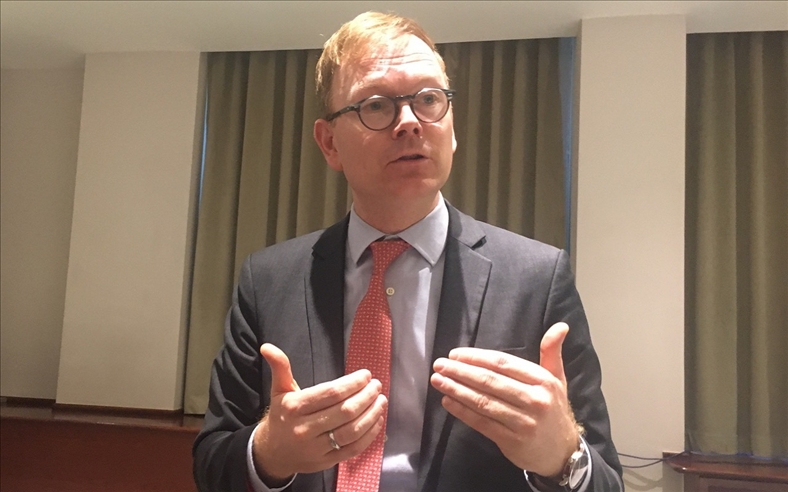Vietnam turns semiconductor vision into action
The global semiconductor industry is being reshaped by geopolitical tensions, shifting supply chains, and the surge of digital technologies.




Looking at Vietnam's macroeconomic indicators over the past seven years, we can see that despite the growth, the national economy still faces many risks related to current account deficits and inflation.

According to the Doing Business 2018 report of the World Bank Group, Vietnam ranks 68 out of the 90 economies evaluated on business environment, increasing by 14 levels compared to 2017.
TheLEADER had a talk with Sebastian Eckardt, World Bank’s Lead Economist for Vietnam, on the economy’s growth engines and also restructuring challenges in the coming time.
Why did the World Bank decide to lower Vietnam's GDP growth forecast to 6.5% in 2018 from 6.7% of this year? Accordingly, what will be Vietnam's main engine for growth in 2018?
Sebastian Eckardt: Basically, we estimate that the growth drivers of Vietnam's economy in 2018 will remain unchanged, including higher domestic demand and spending, increasing consumption in combination with export-oriented growth policy of the Government of Vietnam.
However, we lowered our growth forecast for 2018 to 6.5% as the business environment in Vietnam still has some problems.
Firstly, the agriculture sector has recovered but still faces an array of threats from climate and market.
In addition, many environmental, labor and institutional risks still exist. Issues like Formosa incident or Samsung's violation of labor conditions have negatively impacted investors’ sentiment. These problems could not be absolutely resolved in the near future.
However, Vietnam’s economy, with a lot of growth potentials including strong foreign investment and growing manufacturing sector, can surpass our expectation.
What are the biggest challenges for Vietnam's economy in 2018 and in the medium term?
Sebastian Eckardt: In the short run, Vietnam's biggest challenge would be to fully exploit current growth patterns, especially to take advantage of FDI inflows.
According to our assessment, FDI is the main growth engine for the Vietnam’s economy in at least the next 5 years.
Besides, domestic firms can learn from the experiences of FDI enterprises in management, market access and technology.
The Government of Vietnam should also create a more favorable environment for the development of private sector, as 96% of local firms are small and medium-sized enterprises. They often lack the technology, skills and management capabilities to be able to connect and participate in global value chains.
Thus, the biggest challenge for the Government of Vietnam is how to create a favorable environment that enhances the contribution and position of local firms while making good use of FDI flows.
How do you evaluate the process of equitization and divestment of state-owned enterprises (SOEs)?
Sebastian Eckardt: With regard to the equitization of SOEs, Vietnam has made a lot of progress in terms of quantity. However, the challenge now is how to improve the quality of the process. In many cases, the State still holds the majority of stake.
Vietnam should promote a deeper equitization process to offset the budget deficit and, more importantly, help businesses access not only new capital sources but also facilitate them to approach high technology and valuable management experience.
This can help Vietnam’s economy grow robustly and become an attractive investment destination.
How can Vietnam maintain a necessary budget balance to achieve priority objectives?
Sebastian Eckardt: In my opinion, Vietnam needs to rebuild its buffer zones and buffer capital to strengthen fiscal policy, reduce public debt and create stronger budgets for the government to achieve medium and long term goals.
In addition, the promotion and strengthening of risk management systems has not been effective, especially in asset management issues of banks and financial institutions.
I think that Vietnam needs cautious approaches to manage credit growth and allow it to be regulated by the market’s supply and demand mechanism.
However, in recent years, the process of handling bad debts of the banking sector has made much progress. I highly appreciate the efforts of the Government, especially the Decree 42, which provides a sufficient legal framework to deal with many issues related to bad debts resolution.
What are the underlying reasons of the message from WB’s ‘Take stock’ report that Vietnam should shift from achieving macroeconomic stability to strengthening resilience to economic shocks?
Sebastian Eckardt: Looking at Vietnam's macroeconomic indicators over the past seven years, we can see that despite the growth, the national economy still faces risks related to current account deficits and inflation.
The fact that Vietnam becomes a middle income country leads to lower ODA capital. Thus, Vietnam should make full use of capital markets to expand its business, improve the health of the economy against external shocks.
Stagnant structural reforms can also have a negative impact on recovery, especially when investment growth is weakening. Thus, strengthening macroeconomic resilience and structural reform are the directions to increase Vietnam's growth potentials in the medium term.
Thank you very much!
The global semiconductor industry is being reshaped by geopolitical tensions, shifting supply chains, and the surge of digital technologies.
The change in APA approval authority is expected to shorten processing time and enhance business proactiveness in international tax negotiations.
As hybrid cloud systems grow more complex, Vietnamese enterprises are struggling to detect cybersecurity threats moving laterally within their own networks.
The submission of the draft resolution on Vietnam’s international financial center to the National Assembly heralds a new developmental era for the country.
More than just running a 5-star resort, Kristian Petersen is redefining the art of hospitality with a humane and sustainable leadership philosophy.
For Tyna Huynh, co-founder of Drinkizz, organic is not just a food choice but a way of life that fosters a deep connection between people, nature and community.